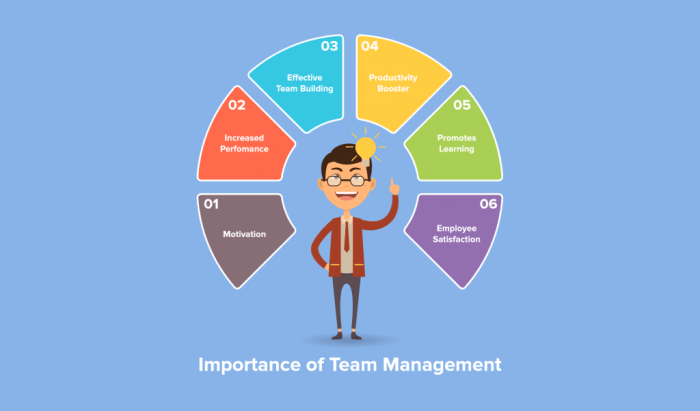Team Management Skills are key in the professional world, impacting productivity and team performance. From effective communication to conflict resolution, these skills are vital. Let’s dive into the world of team management skills with a fresh perspective that resonates with high school hip vibes.
In this comprehensive guide, we’ll explore the importance of these skills, break down the essential key skills, discuss strategies for improvement, and delve into building a strong team culture. Get ready to elevate your team management game!
Importance of Team Management Skills
Team management skills are crucial in a professional setting as they help ensure that a group of individuals can work together effectively towards a common goal. Without proper team management, tasks may become disorganized, communication may break down, and conflicts may arise, leading to decreased productivity and morale.
Enhanced Productivity
Effective team management skills can greatly enhance productivity in the workplace. When a team is well-managed, tasks are delegated efficiently, deadlines are met, and team members are motivated to perform at their best. This results in a more efficient workflow and ultimately leads to higher output and success for the organization.
Impact of Poor Team Management
Poor team management can have a detrimental impact on team performance. When a team lacks proper leadership and direction, members may feel confused about their roles, experience conflicts with one another, and struggle to meet deadlines. This can lead to decreased morale, increased turnover, and ultimately, a decline in overall productivity.
Key Team Management Skills
Effective team management requires a diverse set of skills that enable leaders to communicate effectively, delegate tasks efficiently, resolve conflicts, and more. Each key skill plays a crucial role in ensuring the success of a team.
Communication
Communication is essential in team management as it allows leaders to convey expectations, provide feedback, and foster collaboration among team members. Clear and open communication helps prevent misunderstandings and promotes a positive work environment where everyone feels heard and valued.
Delegation
Delegation is the art of assigning tasks to team members based on their strengths and abilities. Effective delegation ensures that work is distributed evenly, increases productivity, and empowers team members to take ownership of their responsibilities. It also helps leaders focus on strategic decision-making and long-term goals.
Conflict Resolution
Conflict is inevitable in any team setting, but how it is managed can make or break a team’s success. Leaders skilled in conflict resolution can address issues promptly, facilitate discussions to find common ground, and promote a harmonious work environment. By resolving conflicts constructively, teams can maintain productivity and morale.
Decision-Making
Strong decision-making skills are crucial for team managers to make timely and effective choices that benefit the team as a whole. Leaders must weigh options, consider different perspectives, and take decisive action to move the team forward. Good decision-making instills confidence in team members and fosters trust in leadership.
Adaptability
In today’s fast-paced work environment, adaptability is a key skill for team managers to navigate unexpected challenges and changes. Being flexible and open to new ideas allows leaders to adjust strategies, pivot when necessary, and keep the team on track towards its goals. Adaptability also encourages innovation and resilience within the team.
Strategies for Developing Team Management Skills

Developing team management skills is crucial for effective leadership and successful project completion. Here are some strategies to help individuals enhance their team management abilities over time.
Continuous Learning and Self-Reflection
Engage in continuous learning by reading books, attending seminars, and taking online courses related to team management. Reflect on your experiences and identify areas for improvement.
Effective Communication
Improve your communication skills by actively listening to team members, providing clear instructions, and offering constructive feedback. Communication is key to successful team management.
Building Trust and Relationships
Focus on building trust with your team members by being transparent, reliable, and supportive. Foster positive relationships to create a cohesive team environment.
Delegation and Empowerment, Team Management Skills
Learn to delegate tasks effectively by understanding team members’ strengths and weaknesses. Empower your team by giving them autonomy and trusting them to deliver results.
Conflict Resolution
Develop skills in conflict resolution by addressing conflicts promptly, listening to all parties involved, and finding solutions that benefit the team as a whole. Effective conflict resolution is essential for team success.
Building a Strong Team Culture

Building a strong team culture is essential for the success of any group working towards a common goal. Team management skills play a crucial role in fostering a positive team culture that promotes collaboration, trust, and support among team members.
The Role of Team Management Skills in Fostering a Positive Team Culture
- Effective communication: Team management skills help in promoting open and transparent communication among team members. When team leaders communicate clearly and actively listen to their team, it creates a culture of trust and mutual respect.
- Conflict resolution: Team management skills include the ability to address conflicts constructively and find solutions that benefit the team as a whole. By handling conflicts in a fair and respectful manner, team leaders can prevent negativity from affecting the team culture.
- Empowerment and motivation: Team management skills involve empowering team members to take ownership of their work and providing them with the support and motivation they need to succeed. This leads to a culture of accountability and high performance.
Examples of Successful Team Cultures
- Google: Google is known for its innovative and collaborative team culture, where employees are encouraged to share ideas freely and work together towards common goals. Team management played a crucial role in creating this culture by fostering creativity and empowering employees.
- Zappos: Zappos has a strong team culture focused on customer service and employee satisfaction. Team management skills were instrumental in building this culture by prioritizing employee well-being and creating a supportive work environment.
- Southwest Airlines: Southwest Airlines has a unique team culture based on teamwork, fun, and a shared commitment to customer service. Team management skills were vital in cultivating this culture by promoting a sense of camaraderie and unity among employees.
